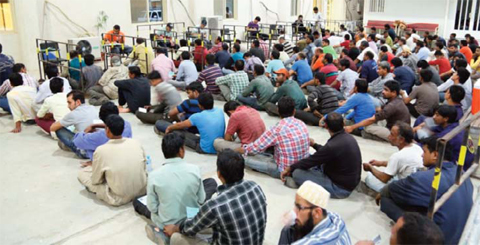Deportations surge as 29,000 expelled in 2016
KUWAIT: Well-informed security sources said that 29,000 expats had been deported in 2016 - almost 80 expats daily - which indicates deportation has been accelerated more than ever. The sources added that the reasons for deporting those expats varied between residency law violations and criminal violations such as traffic law violations, felonies and crimes.
According to the report in Al-Qabas daily, the deportation prison management takes good care of deported expats and all the deportation prison inmates only remain in detention for a maximum of a week until a ticket is provided and other paperwork is finalized. The sources added that flight tickets for deported expats are usually booked from travel agencies at the prison.
"However, some deportees remain in prison for a month or two because of financial claims and obligations against them, as they have to attend court hearings," explained the sources, noting that good quality catering and cleaning services are provided.
Statistically, the sources explained that 26 percent of deportees are Indians, 22 percent are Egyptians, 13 percent from the Philippines, 13 percent Ethiopian, 6 percent Sri Lankan and 5 percent are Bangladeshis. "These six nationalities form 80 percent of the deportees, while those from other nationalities form only 20 percent," the sources concluded.
Meanwhile, a number of lawmakers said that for security, economic and social reasons, it has become a must to immediately act in order to adjust Kuwait's demography, according to a report in Al-Rai daily. Accordingly, the lawmakers demanded deporting a million expats within 5-10 years with an annual rate of 100,000 expats, which means their rejection of the minster of social affairs and labor's suggestion to adjust the population structure within 15 years.
"Unless the government is serious in solving the problem and reducing the number of marginal workers, the society will continue to suffer from imported crimes," the lawmakers warned, calling for setting a certain quota per nationality because it is unacceptable that half of the expatriates living in Kuwait belong to only one nationality.
In this regard, MP Waleed Al-Tabtabaei called for setting a well-studied strategic law to organize Kuwait's demography and increase the number of citizens to over 50 percent of the population. "This means reducing the number of expats by 10 percent annually and getting rid of those the Kuwaiti market does not need," he underscored.
MP Mohammed Al-Huwailah said that like other GCC states, Kuwait is suffering from demographic imbalances and that this can only be resolved by good planning. "This does not need 15 years as the minister said," he underlined, noting that the problem can be resolved within five years by setting a well-structured plan.
Commenting on the same, the head of the parliamentary human rights committee MP Adel Al-Damkhi called for holding visa traffickers legally accountable and for incriminating human trafficking. He also called for appointing more Kuwaitis in the government sector. MP Osama Al-Shaheen said it was unacceptable that expats form two-thirds of the population. "Generally speaking, we are not against expats and do not deny the contributions of some, but the fact that Kuwaitis are outnumbered calls for a serious stand," he said.











